|

 |
 |
 |
 |
Climate Adaptation - Learning the Lessons from Communities
Presented by Coastal Development Partnership and Practical Action
|
|
 |
 |
 |
 |
|
 |
 |
 |
 |
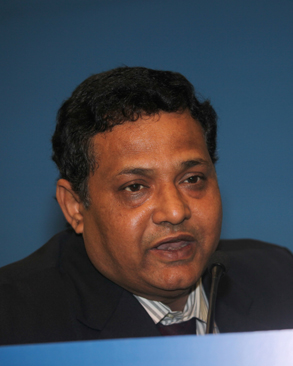 |
| Nazmul Chowdhury, Practical Action, Bangladesh, said about 10 million of the 150 million people in Bangladesh are affected by catastrophic events such as flooding, tornados and soil erosion, and have to depend on external relief and rehabilitation. |
|
 |
 |
 |
 |
|
|
In this event moderated by Nicholas Milton, Practical Action, two speakers from Bangladesh presented community experiences with adaptation.
Nazmul Chowdhury, Practical Action, Bangladesh, presented innovative means of promoting economic empowerment and climate resilience among poor households, including: sandbar cropping (farming on silted sand plains left behind by floods); floating garden cultivation (farming on floating gardens of water hyacinth); cage aquaculture (raising fingerlings in cages); duck farming; and building “cluster villages” for displaced communities following disasters.
Chowdhury stressed the UN Framework Convention on Climate Change (UNFCCC) process should prioritize adaptation and allocate half the funds available for climate change to adaptation. He also called on developed countries to honor their pledges to the Green Climate Fund, and for the Government of Bangladesh to ensure that communities and stakeholders have better access to funding.
Syed Jahangir Hasan Masum, Executive Director, Coastal Development Partnership, described lessons learned from his organization’s facilitation of community-driven climate change adaptation actions in different ecosystems in Bangladesh, particularly through the People’s Empowerment for Addressing Climate Justice and Environmental Justice (PEACE) programme. He described PEACE as a comprehensive, bottom-up adaptation planning process starting from the village level, directly guided by the most vulnerable groups including the extreme poor and marginalized.
Among the key lessons learned from the PEACE programme, Masum listed the importance of: respecting ecosystem approaches; cooperating and sharing of resources and lessons among communities; engaging in holistic community development by including elements such as education and health; integrating and mainstreaming adaptation into other programmes and initiatives to improve efficiency and effectiveness; and using community mechanisms to cope with disasters. Among the challenges, he listed capacity building for non-governmental and community-based organizations, and promoting the understanding of adaptation as a community development issue.
Masum said the PEACE communities call on the UNFCCC negotiations to work together to: find a solution while avoiding hostility; follow a community-driven approach even in the global negotiations; respect the polluter pays principle and the principle of common but differentiated responsibilities; and address climate change resilient agriculture and loss and damage.
In the discussion that followed, participants discussed: whether microcredit promotes or discourages community-driven approaches; markets for farm produce to maximize benefits for the producers; and the importance of direct access to finance by communities, for community-driven approaches.
|
 |
 |
 |
 |
Sustainable Agriculture, Food Security and Climate Change: How Can Climate-Smart Approaches Help to Build Resilience in Food Security and Agriculture?
Presented by the UN Food and Agriculture Organization (FAO)
|
|
 |
 |
 |
 |
The event, moderated by Alexander Mueller, Assistant Director-General, FAO, discussed climate-smart agriculture resilience, barriers to scaling up climate-smart agriculture and benefits to the poor and most vulnerable.
Mueller called for climate smart agriculture, identifying lessons learned. He said the potential for expansion is limited despite the need for increased productivity, and that the new challenge is to expand agriculture into low potential production zones. He asked panelists to address: how climate-smart approaches can be used to build resilience; barriers to scaling-up climate-smart practices; and how the poorest and most vulnerable can benefit from climate-smart approaches.
On building resilience, Austin Tibu, Ministry of Agriculture and Irrigation Development, Malawi, noted the need to adapt the agriculture sector to climate variability and ensure adequate food supplies for communities. He said practices like conservation agriculture can improve productivity, while increasing resilience to droughts and floods and generating mitigation co-benefits.
Damdin Dagvadorj, Special Envoy on Climate Change, Ministry of Environment and Green Development, Mongolia, noted the need for climate resilient agriculture in Mongolia. He highlighted that mining, overgrazing and natural disaster impacts are decreasing agricultural productivity.
On barriers to scaling up, Agnes Otzelberger, CARE International, said building resilience and adaptive capacity is about institutions and stakeholder participation. She highlighted proactive farmer-to-farmer approaches, identification of future risks and uncertainties, and development of processes to cope with uncertainties. She called for engaging farmers to produce and deliver climate data, to facilitate the increasing demand for climate information.
On benefits for the poorest and most vulnerable, James Kinyangi, International Livestock Research Institute (ILRI), stressed the need to create a critical mass of practitioners engaging in climate smart agriculture. Underscoring external drivers such as conflict, population growth and changes in nutritional patterns, he noted the importance of working in partnerships that bring together policymakers, donors and experts to ensure the poor benefit in face of these pressures.
During discussions Tibu said Malawi is encouraging networking among farming communities to make decisions related to climate change. Dagvadorj called for early warning systems and climate services for climate-smart agriculture.
Kinyangi called for narrowing the differences in negotiations on agriculture at COP 18, saying he hoped for agreement. Mueller highlighted the importance of maintaining traditional systems, noting these systems will have to adapt as well.
In closing, Gernot Laganda, International Fund for Agricultural Development, and Catherine Zanev, World Food Programme, welcomed the discussion and called for up-scaling what already works in rural development.
|
 |
 |
 |
 |
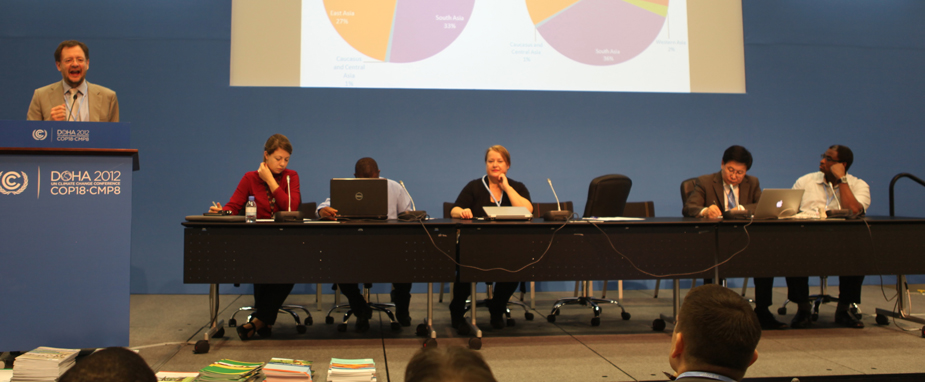 |
Panel (L-R): Alexander Mueller, Assistant Director-General, FAO; Agnes Otzelberger, CARE International; Austin Tibu, Ministry of Agriculture and Irrigation Development, Malawi; Tiina Vahanen, FAO; Damdin Dagvadorj, Special Envoy on Climate Change, Ministry of Environment and Green Development, Mongolia; James Kinyangi, ILRI.
|
|
 |
 |
 |
 |
 |
 |
 |
 |
Luxury or Necessity: A Framework of Various Approaches Under the UNFCCC
Presented by the Centre for European Policy Studies (CEPS)
|
|
 |
 |
 |
 |
Pedro Martins Barata, former lead negotiator for the EU on carbon markets, introduced and moderated the session, which addressed the question of the need for a Framework for Various Approaches (FVA) under the UNFCCC and considered what outcomes might emerge from Doha on the FVA and the New Market Mechanism (NMM).
Andrei Marcu, Carbon Market Forum, CEPS, presented a paper on the need for the FVA, prepared as a submission to the Ad Hoc Working Group on Long-term Cooperative Action (AWG-LCA). Noting that the Clean Development Mechanism no longer has a monopoly on offsetting and carbon credits, he underscored the need for a framework to address accounting and linking challenges.
Tamara Curll, Australia, said the absence of FVA would not prevent the development and implementation of national and sub-national market mechanisms, but agreed that a framework could help maximize the contribution of these mechanisms to emissions reductions. She suggested the FVA should facilitate the development and implementation of market mechanism approaches and coordinate their interaction.
Erika Hasznos, European Commission, agreed on the need for parties to clarify the functions of the FVA, suggesting it should have common accounting rules and facilitate tracking. She articulated different functions for the FVA and NMM, noting the latter aims to move beyond a project-based approach and scale up existing market mechanisms. She emphasized the need for conformity checks with international supervision.
Eva Filzmoser, Carbon Market Watch, offered comments on the principles of environmental integrity and the AWG-LCA text. On environmental integrity, she called for ensuring that the FVA contributes to sustainable development, noting that mitigation actions must be clean, safe, sustainable, efficient and non-fossil fuel based. She agreed with the importance of domestic systems to the FVA, noting it might be significant in the context of avoiding double counting.
Giovanni Bertolino, ENEL, reflected on the value of FVA to the private sector. He noted the FVA shifts away from project-based approaches and towards sectoral approaches. He called the framework a “necessity,” pointing to the FVA as part of the “building blocks” for global carbon markets. He urged for the FVA and NMM to have a clear top-down regulator to define basic standards and key principles.
During discussions, participants and panelists: considered the consequences, under a two-track FVA, of a negative review under the transparency track; questioned the need for a NMM given the “massive oversupply” of offset credits already on the market; and asked whether, with many domestic market mechanisms already in place, the development of the FVA comes too late.
|
 |
 |
 |
 |
Breakthrough Changes to Ensure Gender Equality in Climate
Change Policies and Practices
Presented by GenderCC – Women for Climate Justice, the Global Gender and Climate Alliance (GCCA), LIFE and Women’s Environment and Development Organization (WEDO)
|
|
 |
 |
 |
 |
As part of UNFCCC’s Gender Day, participants met in an extended side-event comprising a high-level opening, a panel discussion on gender and climate, and a breakout session with audience participation. The high-level opening was moderated by Cate Owren, Executive Director, WEDO, the panel discussion was moderated by Gotelind Alber, GenderCC, and the breakout session was moderated by Ulrike Röhr, LIFE.
During the high-level opening session, UNFCCC Executive Secretary Christiana Figueres stressed that the present generation will be accountable to the next seven generations for their action or inaction on climate change. Underscoring the authority that knowledge lends to the climate change discourse, she urged participants to act in their individual capacities to forward the inclusion of gender into this discourse and subsequent action.
Lauding the progress on inclusion of women in decision-making processes in her country, Alcinda Abreu, Minister of the Coordination of Environmental Affairs, Mozambique, noted that much remains to be done to ensure the reduction of global carbon emissions. Drawing attention to her country’s increasing vulnerability to climate change impacts, she lauded the efforts of women in addressing these challenges, noting the increased use of clean cook stoves and better agricultural practices to ensure greater food security.
Mary Robinson, President, Mary Robinson Foundation for Climate Justice (MRFCJ), called for stronger action to be taken at COP 18. Introducing Cecilia Kibe, Coordinator, Kenya Climate Justice Women Champions, Robinson praised the often unrecognized efforts of women working at the grassroots level to adapt to climate change. She introduced participants to a draft decision to be considered by COP 18 on gender balance in the structure of the UNFCCC.
In the panel discussion, Agnes Otzelberger, CARE International, commented on language used to communicate the gender message, stressing that women are often painted as either “victims” of climate or “leaders” in environmental protection. She urged participants to not simplify the complex debate on gender and climate, and stated that women and men should be given equal opportunities to act on climate.
Kahealani Hekau, Pacific Gender Climate Coalition, called for participants to use participatory processes when dealing with communities affected by climate change, and also stressed the importance of building meaningful relationships with these communities. She called for attentiveness on how gender and climate is presented, noting that this discourse affects the way gender is treated.
Yvette Abrahams, GenderCC Africa, stressed that for the gender debate to affect policy at the country-level, the entire national system has to work. Gender equality cannot be achieved in a vacuum, she said, pointing to the failure of some national systems in addressing other aspects of climate change.
Farah Kabir, ActionAid Asia, emphasized that for gender to be at the forefront of the discourse on climate change, national policies that are discriminatory towards women need to be changed, including land and property rights, and citizenship policies.
Liane Schalatek, Heinrich Böll Foundation, underscored that the climate finance instruments need to be gender responsive as they involve the use of scarce public resources. She highlighted the importance of having gender as a cross-cutting issue for the Green Climate Fund, and called for improving access for women to climate financing instruments.
Farhana Yamin, University College London, UK, stressed the importance of structural changes in the UNFCCC’s consideration of gender, urging delegates and participants to support a decision to make gender a permanent feature on the COP agenda. She underscored the need to prevent gender parity and gender-sensitivity from being only a “footnote.”
Noting the complex relationship between gender balance and gender-responsive policies, and the need for far-reaching transformations, Moderator Alber opened the floor for questions. Panelists and participants discussed, among other things: steps needed to promote the implementation of the Marrakesh Accord; leadership in the host country region by women, particularly in clean energy; how to engage men in these debates; and women’s engagement in mitigation projects and in the private sector.
Following the panel discussions, Moderator Röhr guided participants in breaking out into “gender innovation hubs,” tasked with addressing one of five issues: mitigation; adaptation; climate finance; technology; and capacity building. These small working groups addressed, respectively: gender responsive, low-carbon development in a resource constrained world; gender equality and adaptation within a development paradigm; finance for what and for whom, and rights, access and control; which technologies are needed and acceptable, and expectations for transfer and sharing of technologies; and what kind of capacity building is needed to ensure implementation of gender-responsive programmes and policies.
Following the hub discussions, the side event reconvened to share their outcomes. The key steps proposed included: training women on negotiation and policy-making techniques; educating women about available climate funds; collecting gender-segregated data; sensitizing business; ensuring gender balance on boards and advisory groups; and changing incentive structures in international financial institutions that are biased against women and gender work.
Nathalie Eddy, GCCA, closed the session, noting a report would be prepared from its outcomes that could be a tool for working towards the breakthrough changes needed to move closer to gender equality.
|
 |
 |
 |
 |
REDD+ Governance and Biodiversity Safeguards: Best Practices Towards UNFCCC and Convention on Biological Diversity (CBD) Common Guidance
Presented by the Philippines Climate Change Commission, Federal Office for the Environment Switzerland, Ateneo School of Government and Helvetas Swiss Intercooperation
|
|
 |
 |
 |
 |
|
 |
 |
 |
 |
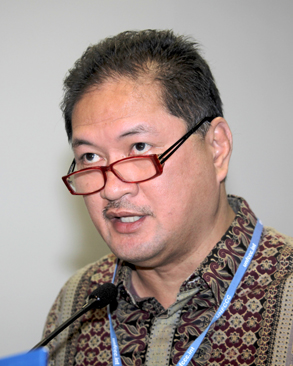 |
| Tony La Viña, Dean, Ateneo School of Government, the Philippines, highlighted that Safeguards Information Systems are a critical platform for demonstrating compliance with REDD+ safeguards that secure results-based payments. |
|
 |
 |
 |
 |
|
|
The event was moderated by Rosalind Reeve, Ateneo de Manila University, the Philippines.
Naderev Saño, Commissioner, Philippines Climate Change Commission, opened the event, emphasizing the need for safeguards in REDD+ that can be dynamically interpreted, and help achieve broader performance parameters such as protecting community interests, livelihoods, rights and ecosystems.
Tony La Viña, Dean, Ateneo School of Government, the Philippines, presented the findings of a Swiss-Philippine initiative “Towards Building a Governance Framework for REDD+ Financing” launched in 2011. He highlighted key messages from the initiative: catalyzing adequate financing for REDD+ in all phases of implementation is essential; unlocking private finance requires a demand for REDD+ credits and incentives for sustainable development; and planning for REDD+ financing should be part of a broader policy approach oriented towards country-specific strategies and objectives.
La Viña said parties and stakeholders would benefit from better synergies between the UNFCCC and CBD, and between the various national-level planning processes such as national REDD+ strategies, adaptation plans and biodiversity plans.
Phil Franks, CARE International, presented on the REDD+ Social Environmental Standards (SES) Initiative. He said the SES Initiative lists principles, criteria and indicators for a REDD+ safeguard mechanism at the country level, and outlines a ten-step process for how it can be used. The process covers three main elements: governance, interpretation and assessment.
Dil Raj Khanal, Federation of Community Forestry Users, Nepal (FECOFUN), presented on Nepal’s experience in implementing the REDD+ SES Initiative. He highlighted several lessons, including the need for: building capacity throughout the process; using existing mechanisms to avoid overlaps and enhance coordination; enabling key stakeholders to participate; and creating confidence and ownership among stakeholders.
During a panel discussion that followed, Keith Anderson, Federal Office for the Environment, Switzerland, presented a donor country perspective. He said the Initiative was launched to create space to discuss REDD+ issues, and make progress on safeguards, which are essential for both donors and recipients.
Iwan Wibisono, REDD+ Task Force, Indonesia, presented the implementing country perspective. He said Indonesia is in the process of developing a REDD+ safeguard system called Principles, Criteria and Indicators of REDD+ Safeguards Indonesia (PRESAI).
Juan Carlos Jintiach, Coordinator of Indigenous Organizations of the Amazon River Basin (COICA), presented on Indigenous REDD+. He highlighted the need for Indigenous Peoples’ participation in decision-making processes and respect for and recognition of Indigenous Peoples’ rights in safeguards.
Kelly Hertenweg, Federal Public Service Health, Food Chain Safety and Environment, Belgium, spoke on the link between the UNFCCC and the CBD. She encouraged parties to talk to their biodiversity counterparts before formulating national positions on REDD+.
In the discussion that followed, participants addressed: the applicability of REDD+ SES in dry forests; reconciliation of national and global policies in REDD+ safeguards; and the costs involved in developing, implementing and monitoring the safeguards.
The event was closed by Franz Perrez, Ambassador, Head of the International Affairs Division, Federal Office for the Environment, Switzerland. Perrez emphasized the importance of bridging the divide between the UNFCCC and CBD, and linking global policy-making with local experiences.
|
 |
 |
 |
 |
Climate Change Awareness Raising and Education
Presented by the UN Environment Programme (UNEP)
|
|
 |
 |
 |
 |
|
|
 |
 |
 |
 |
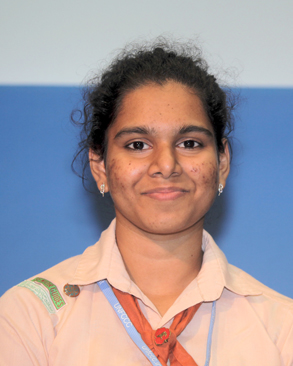 |
| Chathushka Amarasinghe, World Association of Girl Guides and Girl Scouts, shared her experiences as a girl guide that led her to participate in climate change awareness in Sri Lanka. |
|
 |
 |
 |
 |
|
This session, moderated by Yvonne Maingey, former Tunza Youth Advisor for the African region, UNEP, explored the initiatives taken by youth and youth groups to raise awareness on climate change.
Qi Wanqi, Tongji University, China, briefed participants on the efforts of the students at his university to mentor children in primary schools on environmental protection, in order to influence their behavior.
Holly Jones, British Council, noted that education is a vital component in awareness raising on climate change. She informed participants about the UN Educational, Scientific and Cultural Organization’s multidisciplinary approach to education and climate change, which incorporates both the scientific aspects and real life impacts of climate change.
Guo Ru, Tongji University, China, highlighted her university’s leading role in the field of environment for sustainable development, drawing attention to the university’s partnership with UNEP to offer additional accreditation to students in their programme.
Chathushka Amarasinghe, World Association of Girl Guides and Girl Scouts, spoke on the importance of non-formal education and emphasized the need to promote environmental stewardship at an early age. She shared her experiences with learning about the environment and called on governments to finance climate education targeted at young people.
Daniel Ajiroba, Nigeria Youth Climate Coalition, shared experiences with establishing school farms around his country to inform young people of sustainable agricultural practices. He emphasized the need for the youth engaged in climate change awareness and education to document their efforts in order to present it to governments as evidence of work being done, and as leverage for funding.
Noting that young people grow up to be decision-makers, Stephanie Hodge, UN Children’s Fund (UNICEF), highlighted the need for both formal and informal education to raise awareness of climate change and its impacts. She launched a UNEP/UNICEF resource kit for governments on environmental education for children and youth.
Jamie Peters, UK Youth Climate Coalition, called on youth to be active participants in defining the green economy so that it represents their needs, and the needs of future generations.
Bob Natifu, Ministry of Water and Environment, Uganda, spoke on a UN Institute for Training and Research-sponsored programme to strengthen human resources, learning and sustainable development in his country.
They concluded by agreeing that young people need to “go out and act,” conscious that it is important to partner with governments in order to access finance and influence policy-making.
|
 |
 |
 |
 |
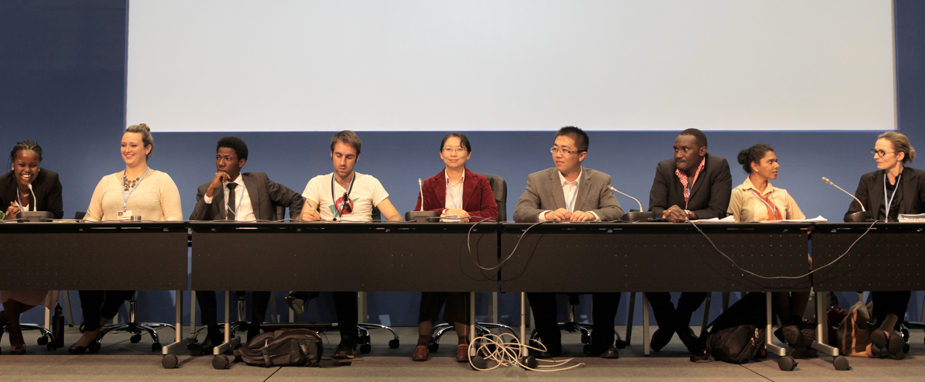 |
Panel (L-R): Moderator Yvonne Maingey, former Tunza Youth Advisor for the African region; Holly Jones, British Council; Daniel Ajiroba, Nigeria Youth Climate Coalition; Jamie Peters, UK Youth Climate Coalition; Guo Ru, Tongji University, China; Qi Wanqi, Tongji University, China; Bob Natifu, Ministry of Water and Environment, Uganda; Chathushka Amarasinghe, World Association of Girl Guides and Girl Scouts; and Stephanie Hodge, UNICEF.
|
|
 |
 |
 |
 |
 |
 |
 |
 |
 e-mail the
Digital Editor
should you have any questions regarding the content of this page
e-mail the
Digital Editor
should you have any questions regarding the content of this page |
 |
 |
 |
 |
The Earth Negotiations Bulletin on the side (ENBOTS) © <enb@iisd.org> is a special publication of the International Institute for Sustainable Development (IISD) in cooperation with the State of Qatar. This issue has been written by Tallash Kantai, Kate Neville, Anna Schulz and Anju Sharma. The Digital Editor is Kate Harris. The Editor is Liz Willetts <liz@iisd.org>. The Director of IISD Reporting Services is Langston James “Kimo” Goree VI <kimo@iisd.org>. Support for the publication of ENBOTS at the Doha Climate Change Conference - November 2012 has been provided by the State of Qatar. The opinions expressed in ENBOTS are those of the authors and do not necessarily reflect the views of IISD and funders. Excerpts from ENBOTS may be used in non-commercial publications only with appropriate academic citation. For permission to use this material in commercial publications, contact the Director of IISD Reporting Services at <kimo@iisd.org>. Electronic versions of issues of ENBOTS from the Doha Climate Change Conference - November 2012 can be found on the Linkages website at http://enb.iisd.org/climate/cop18/enbots/. The ENBOTS Team at the Doha Climate Change Conference - November 2012 can be contacted by e-mail at <anna@iisd.org>.
|
|
|